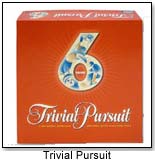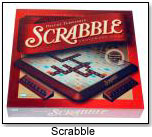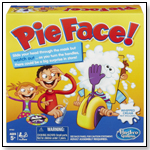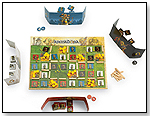|
|
Board Games: Learning About Strategy, Learning About Life Updated by Editors on 12/30/2024
 Technology – everything from computers to appliances that talk to me to my children’s toys – has always intimidated me. My daughters have Juice Box (Mattel), a toy whose many uses – as a VCR, MP3 player, and photo album – defy its tiny size. My toddler plays with Silly Parts Talking Elmo (Fisher-Price), a funny fellow who magically knows if you have disguised him with an elephant trunk or chicken wings. Technology – everything from computers to appliances that talk to me to my children’s toys – has always intimidated me. My daughters have Juice Box (Mattel), a toy whose many uses – as a VCR, MP3 player, and photo album – defy its tiny size. My toddler plays with Silly Parts Talking Elmo (Fisher-Price), a funny fellow who magically knows if you have disguised him with an elephant trunk or chicken wings.
But as I’ve watched these electronic amazements, I’ve noticed something else: High-tech toys are often single-player toys. Even toys that allow for more than one player like Nintendo DS don’t encourage true interactive play.
Along with a good time, these board games still offer their players the same things they did decades ago. Some of the lessons are simple: counting, color recognition, and that all-important skill, taking turns. As the children become older and the games become more complex, they learn to plan ahead, to anticipate others’ moves, and to be a good loser (and winner). While my children were throwing the dice and learning so many lessons that will serve them well in life, I was learning too. It was during a quick game of Mancala during breakfast that I learned that my 10-year-old daughter’s seatmate had begun to perform whispered, but still distracting, imitations of Ozzy Osbourne (complete with colorful language) during math class. Scrabble taught me that my older daughter suddenly found herself involved in a “sing to the death” fight for the lead in the school musical. And she was worried that being the winner might make her a loser as far as friends were concerned. Who knows what makes the board game such an ideal place for confidences? Perhaps it’s the slower pace that the movement of a game piece requires or the focus on just one or two people to the exclusion of the dirty laundry, the work deadlines, and the ringing telephone.
As my girls become older and their lives more complex, I’ve tried to stifle the tempting urge to say “no time” when they ask to play a game after supper. Instead, I’m dragging out the battered boxes and counting out the play money. You never know what you’re going to learn about someone when they land on Park Place. Updates: The Resurgence of Board Games in the Digital AgeWhile video games and digital entertainment continue to dominate the market, board games have experienced a remarkable renaissance in recent years. The global board games market size was valued at USD 13.75 billion in 2021 and is expected to expand at a compound annual growth rate (CAGR) of 7.8% from 2022 to 2030. This resurgence is partly attributed to millennials and Gen Z seeking more tangible, face-to-face social experiences.Recent studies have reinforced the cognitive benefits of board games. A 2019 study published in the Journals of Gerontology found that people who played more games in their 70s were more likely to maintain healthy cognitive function in their 80s. This underscores the lifelong benefits of engaging in board game play.
Top 10 Board Games for Family Bonding and Skill Development
Incorporating Board Games in the Classroom: A Teacher's GuideBoard games can be powerful educational tools when integrated into the curriculum. They offer hands-on learning experiences that engage students and reinforce various skills. Here's how to effectively use board games in your classroom:
 Writer's Bio: The mother of three children ages 13, 10 and 2, Jodi Webb started out as a toy seller. She´s happy to find a job where her accountant will let her write off her toy purchases! Read more articles by this author Writer's Bio: The mother of three children ages 13, 10 and 2, Jodi Webb started out as a toy seller. She´s happy to find a job where her accountant will let her write off her toy purchases! Read more articles by this author |
| ||||||||||||||||||||||||||||||||
Disclaimer Privacy Policy Career Opportunities
Use of this site constitutes acceptance of our Terms of Use.
© Copyright 2025 PlayZak®, a division of ToyDirectory.com®, Inc.

 That’s why I’m glad that our home is also full of a plenitude of board games, playthings that the experts describe as low-tech and I describe as relationship-friendly. Some are identical to the ones gathering dust in my mom’s basement:
That’s why I’m glad that our home is also full of a plenitude of board games, playthings that the experts describe as low-tech and I describe as relationship-friendly. Some are identical to the ones gathering dust in my mom’s basement: 


